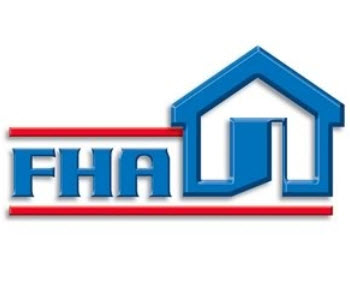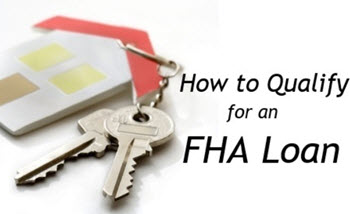In the United States, you may be able to obtain better conditions for your mortgage loan if you get it insured by the Federal Housing Administration (FHA). The insurance makes the loan less risky for the lender, since the FHA mortgage insurance will protect the lender if you default on your loan.
 FHA mortgage insurance can mean that you get approved for a loan that you would otherwise have been denied for.
FHA mortgage insurance can mean that you get approved for a loan that you would otherwise have been denied for.- FHA mortgage insurance can make the lender willing to lend you more money than without the insurance.
- FHA mortgage insurance can make it possible for you to obtain a loan with better conditions (e.g. lower interest rate) than what would otherwise be available to you.
At the time of writing (2016), there are roughly 5 million single-family mortgage loans with FHA-insurance in the United States. If we look at only new home mortgage loans, over 40% of them are FHA-insured.
The Federal Housing Administration (FHA) is under the U.S. Department of Housing and Urban Development (HUD). If you default on an FHA-insured mortgage loan and it goes into foreclosure, HUD will compensate the lender and take possession of the mortgaged property. In most cases, HUD will then try to sell the property at a HUD actions.
FHA-insurance is an alternative to private mortgage insurance
In the United States, a lender will typically require that you obtain mortgage insurance if you want to borrow more than 80% of the market value of the property. Your own creditworthiness can be of importance here. A person with high creditworthiness may for instance be approved for an 85% mortgage loan without mortgage insurance, while a person with low creditworthiness can be asked to obtain mortgage insurance for a 75% mortgage loan.
There are a lot of private companies that sell mortgage insurance (private mortgage insurance = PMI). The problem for many prospective owners is that the cost of PMI depends on the borrower’s credit score. If your credit score is 620 or lower, the cost will be substantial. If your credit score is under 575, it might even be difficult for you to find any company willing to sell your PMI.
The typical recipient of mortgage insurance from the FHA is someone who can not qualify for PMI or who would have to pay a lot for PMI.
The idea of letting the federal government help prospective home-owners to obtain mortgage insurance goes back to the Great Depression Era when a lot of people lost their properties and it was difficult for young families to borrow money to purchase a home of their own. The government agency U.S. Federal Housing Administration (FHA) was created by the National Housing Act of 1934. This agency has a lot of things on its plate, including the task of helping qualifying prospective home-owner with mortgage insurance. Since 1934, FHA / HUD has insured approximately 35 million single-family mortgage loans.
Do I borrow money from the FHA?
 No, you don’t borrow money from the FHA. The FHA works with a long list of approved third-party lenders that will lend you money provided that you fulfill their requirements and have FHA mortgage insurance.
No, you don’t borrow money from the FHA. The FHA works with a long list of approved third-party lenders that will lend you money provided that you fulfill their requirements and have FHA mortgage insurance.
Is is always a good idea to compare offers from several FHA-approved lenders before you make any decision. Just because they are all approved by the FHA doesn’t mean they all have the same terms and conditions for their loans. The FHA does not set the interest rates for loans offered by FHA approved lenders.
Is FHA mortgage insurance free?
No, you pay for FHA mortgage insurance. Even though it is a federal assistance program, it is not free of charge for the recipient. The idea is to help prospective home-owner obtain mortgage insurance, not to give them mortgage insurance for free.
-
You must pay UFMIP to the FHA
You pay an upfront mortgage insurance premium (UFMIP) equal to 1.75% of the base loan amount.
Most FHA-approved lenders will allow you to borrow money to cover this cost.
-
You must pay a yearly insurance premium to the FHA
Every year, you pay an annual insurance premium to the FHA for you mortgage insurance. Unlike private mortgage insurance, the size of the premium is not impacted by your creditworthiness. Instead, it is only based on the loan-to-value (LTV) ratio for the property used as security for the mortgage loan.
This is what the premiums were for the year 2015.
| Loan term | LTV ratio | Premium |
| Max 15 years | 90% or less | 0.45% annually |
| Max 15 years | Over 90% | 0.70% annually |
| More than 15 years | 95% or less | 0.80% annually |
| More than 15 years | Over 95% | 0.85% annually |
-
You must pay a surcharge to the FHA if the loan exceeds $625,000
If the mortgage loan exceeds $625,000 you must pay a surcharge to the FHA. Contact the FHA for more information. Usually, the surcharge will be 0.25 extra percentage points if the loan term is max 15 years, and 0.20 extra percentage points of the loan term is longer than that.
78% LTV ratio
If the original loan-to-value ratio of your loan was 90% or less, then the annual FHA mortgage insurance premium will self-cancel once the loan-to-value ratio goes down to 78%. However, there is a time limit here – you must pay annual FHA mortgage premiums for a minimum of 11 years even if the LTV ratio drops down to 78% before that.
The loan-to-value ratio can go down because of two things:
- The value of the home increases
- The size of the loan goes down (amortization)
If you decrease the size of your loan by making extra amortizations, there will be no automatic self-cancellation when your LTV ratio reaches 78%. However, you can contact the lender and ask them if they would allow you to keep the loan even without mortgage insurance. Important: If it is a 30-year loan, you must keep the FHA mortgage insurance until you have made regular payments for 5 years, regardless of the LTV ratio.
The lender doesn’t insist on FHA insurance – should I get it anyway?
Here are cases where the lender will tell a prospective borrower that they will only be approved for the mortgage loan if they obtain FHA mortgage insurance. But there are also cases where the lender is willing to approve your loan even without mortgage insurance. Should you get FHA mortgage insurance anyway?
There is no easy way to answer this question since that will vary from one case to another. In some situations, FHA mortgage insurance can help you negotiate a better loan even though you would be approved for a loan even without FHA mortgage insurance. Voluntary FHA mortgage insurance can be a good idea if the cost of mortgage insurance is less than what you save by negotiating better conditions for your loan.
About the FHA
- The Federal Housing Administration (FHA) was created by the National Housing Act of 1934. This was during the Great Depression, when a lot of people lost their properties and it was difficult to obtain enough credit to purchase a home.
- In 1965, the FHA became a part of the U.S. Department of Housing and Urban Development (HUD).
- The FHA runs a lot of different federal programs, including mortgage insurance programs, interest rate subsidizing programs and rent supplement programs. Originally, the FHA focused only on home-owners. From the 1960s and onwards, its scope has been gradually increase to include renters as well. Since the 1980s, even middle-income families can benefit from FHA rental subsidies.
- By 2006, FHA insured mortgage loans made up less than 3% of the home mortgage loans in the United States. Private mortgage loan insurance (PIM) was readily available, and it is was also fairly easy to be approved for a mortgage loan even without any mortgage insurance. The subprime crisis of the late 2000s dramatically changed this situation. Soon, over one third of all home purchases in the U.S. were financed with FHA-insured mortgage loans.
This article was last updated on: April 26, 2016

